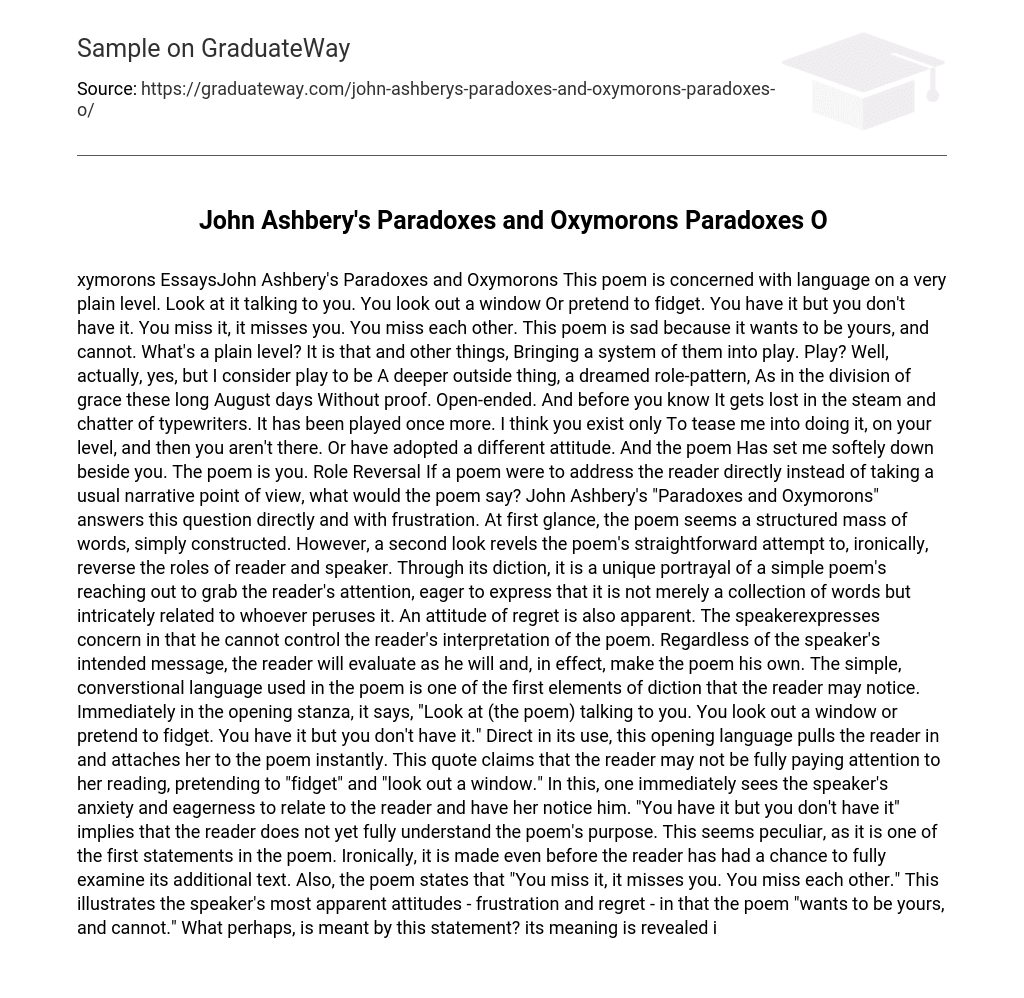xymorons EssaysJohn Ashbery’s Paradoxes and Oxymorons This poem is concerned with language on a very plain level. Look at it talking to you. You look out a window Or pretend to fidget. You have it but you don’t have it.
You miss it, it misses you. You miss each other. This poem is sad because it wants to be yours, and cannot. What’s a plain level? It is that and other things, Bringing a system of them into play. Play? Well, actually, yes, but I consider play to be A deeper outside thing, a dreamed role-pattern, As in the division of grace these long August days Without proof. Open-ended.
And before you know It gets lost in the steam and chatter of typewriters. It has been played once more. I think you exist only To tease me into doing it, on your level, and then you aren’t there. Or have adopted a different attitude.
And the poem Has set me softely down beside you. The poem is you. Role Reversal If a poem were to address the reader directly instead of taking a usual narrative point of view, what would the poem say? John Ashbery’s “Paradoxes and Oxymorons” answers this question directly and with frustration. At first glance, the poem seems a structured mass of words, simply constructed. However, a second look revels the poem’s straightforward attempt to, ironically, reverse the roles of reader and speaker. Through its diction, it is a unique portrayal of a simple poem’s reaching out to grab the reader’s attention, eager to express that it is not merely a collection of words but intricately related to whoever peruses it.
An attitude of regret is also apparent. The speakerexpresses concern in that he cannot control the reader’s interpretation of the poem. Regardless of the speaker’s intended message, the reader will evaluate as he will and, in effect, make the poem his own. The simple, converstional language used in the poem is one of the first elements of diction that the reader may notice.
Immediately in the opening stanza, it says, “Look at (the poem) talking to you. You look out a window or pretend to fidget. You have it but you don’t have it.” Direct in its use, this opening language pulls the reader in and attaches her to the poem instantly. This quote claims that the reader may not be fully paying attention to her reading, pretending to “fidget” and “look out a window.” In this, one immediately sees the speaker’s anxiety and eagerness to relate to the reader and have her notice him. “You have it but you don’t have it” implies that the reader does not yet fully understand the poem’s purpose.
This seems peculiar, as it is one of the first statements in the poem. Ironically, it is made even before the reader has had a chance to fully examine its additional text. Also, the poem states that “You miss it, it misses you. You miss each other.” This illustrates the speaker’s most apparent attitudes – frustration and regret – in that the poem “wants to be yours, and cannot.” What perhaps, is meant by this statement? its meaning is revealed in the poem’s irony. Instead of the reader’s analysis of the poem, “Paradoxes and Oxymorons” presents a poem’s analysis of the reader.
In effect , this reverses the traditional relationship between a piece of literature and its audience. In irony, its result is the reader’s realization that she is no longer the analyst. The poem catches the reader’s attention and this way establishes control over her. Yet on the other thand, the reader’s role in making the poem her own counteracts this. Because the conventional role of the reader seems to be quite conrolling in that she holds the poer to examine and scrutinize literature in general, this role-reversal may come as a surprise to her. The poem now addresses her directly, as if to say, “This is how it’s going to be.” A theme that prevails through this poem is the speaker’s, or author’s, realization of a specific concern.
No matter what the author or speaker intends to generate through a work of literaturein general, it is up to the reder to truly decidee its meaning. Again and again in the realm of poetry there lies the possible nabilty for the reader to grasp whatever message the speaker has put forth. Ashbury’s “Paradoxes and Oxymorons” demonstrates this theme by saying “The poem is you” – that is, to each his won interpretation. The reader must interpret for herself what a poem’s purpose truly is, regardless of the speaker’s intentions.





